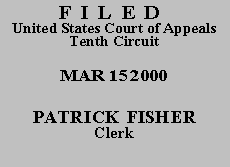

| JACKSON NOFIRE,
Plaintiff-Appellant, v. KENNETH S. APFEL, Commissioner, Social Security Administration, Defendant-Appellee. |
|
We review the Commissioner's decision to determine whether his factual findings were supported by substantial evidence in light of the entire record and to determine whether he applied the correct legal standards. See Castellano v. Secretary of Health & Human Servs., 26 F.3d 1027, 1028 (10th Cir. 1994). "Substantial evidence is such relevant evidence as a reasonable mind might accept as adequate to support a conclusion." Id. (quotations omitted). In the course of our review, we may "neither reweigh the evidence nor substitute our judgment for that of the agency." Casias v. Secretary of Health & Human Servs., 933 F.2d 799, 800 (10th Cir. 1991).
Nofire alleged disability as of June 18, 1994, due to back and knee problems. The administrative law judge (ALJ) determined that Nofire was not disabled at step four of the five-step sequential process, see Williams v. Bowen, 844 F.2d 748, 750-52 (10th Cir. 1988), as Nofire could return to his previous employment as a poultry process worker.
On appeal, Nofire argues the ALJ failed to consider his impairments individually and in combination and failed to address their effect on his ability to perform substantial gainful activity. He also contends that the ALJ failed to address his other impairments of headaches, double vision, chest pain, bronchitis, tussive syncope, atrophic gastritis, and anemia. Finally, Nofire asserts that the ALJ improperly discounted his complaints of disabling pain.
Nofire hurt his back in June 1994. Later, he hurt his knees in an automobile accident. Nofire testified that he is no longer receiving medical treatment for his back problems. His physicians have restricted Nofire from heavy work. None of his other medical problems has resulted in long-term medical treatment or any indication from the treating physician that they require any work-related restrictions.
Nofire argues that the ALJ erroneously failed to discuss each piece of medical evidence in the record. There is no such requirement. While "[t]he record must demonstrate that the ALJ considered all of the evidence, . . . an ALJ is not required to discuss every piece of evidence." Clifton v. Chater, 79 F.3d 1007, 1009-10 (10th Cir. 1996).
Nofire contends that the hypothetical was not precise. The ALJ posed a hypothetical question to the vocational expert (VE) that reflected the nature and severity of Nofire's impairments as borne out by the record. The ALJ's conclusion that Nofire could return to his prior work is supported by substantial evidence. See Decker v. Chater, 86 F.3d 953, 955 (10th Cir. 1996) (hypothetical questions need only reflect impairments and limitations supported by the record).
The ALJ properly analyzed Nofire's complaints of pain and evaluated his credibility. The record shows that Nofire takes only an occasional aspirin for pain. No evidence reflects that Nofire has any pain related restrictions beyond those noted in the hypothetical. "Credibility determinations are peculiarly the province of the finder of fact, and we will not upset such determinations when supported by substantial evidence." Diaz v. Secretary of Health & Human Servs., 898 F.2d 774, 777 (10th Cir. 1990).
The judgment of the United States District Court for the Northern District of Oklahoma is AFFIRMED.
ENTERED FOR THE COURT
Circuit Judge
*. This order and judgment is not binding precedent, except under the doctrines of law of the case, res judicata, and collateral estoppel. The court generally disfavors the citation of orders and judgments; nevertheless, an order and judgment may be cited under the terms and conditions of 10th Cir. R. 36.3.
1. After examining the briefs and appellate record, this panel has determined unanimously to grant the parties' request for a decision on the briefs without oral argument. See Fed. R. App. P. 34(f); 10th Cir. R. 34.1(G). The case is therefore ordered submitted without oral argument.